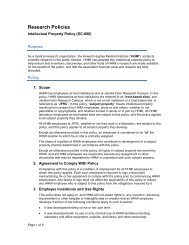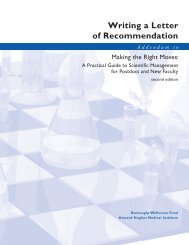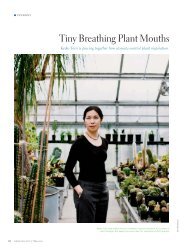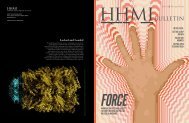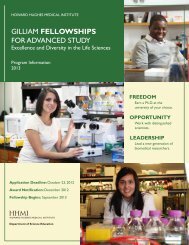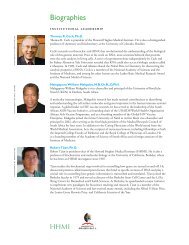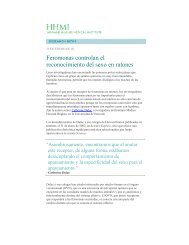Training Scientists to Make the Right Moves - Howard Hughes ...
Training Scientists to Make the Right Moves - Howard Hughes ...
Training Scientists to Make the Right Moves - Howard Hughes ...
Create successful ePaper yourself
Turn your PDF publications into a flip-book with our unique Google optimized e-Paper software.
Appendix 2 The BWF-HHMI Courses in Scientific Management<br />
Two Sessions for Two Distinct Groups: Basic <strong>Scientists</strong> and<br />
Physician-<strong>Scientists</strong><br />
Two sessions were targeted <strong>to</strong> two distinct groups: basic scientists and<br />
physician-scientists. The decision <strong>to</strong> develop <strong>the</strong>se two new sessions was a<br />
direct outcome of <strong>the</strong> 2002 evaluation, in which many participants who<br />
were conducting basic research thought that <strong>to</strong>o much time was being<br />
devoted <strong>to</strong> <strong>the</strong> challenges faced by <strong>the</strong> physician-scientist. Although <strong>the</strong><br />
course organizers recognized <strong>the</strong> benefit of familiarizing each group with<br />
<strong>the</strong> o<strong>the</strong>r’s issues, <strong>the</strong>y also decided that <strong>the</strong>re would be significant benefit<br />
<strong>to</strong> hold concurrent sessions for each group.<br />
Strategies for Success for Basic <strong>Scientists</strong>. This session consisted of a<br />
90-minute panel discussion with three senior basic scientists, each giving a<br />
10-minute presentation, followed by open discussion with <strong>the</strong> audience.<br />
Success for new basic scientists in an academic department is often defined<br />
in terms of achieving tenure. Panelists provided some advice on key issues<br />
for tenure-track basic scientists: securing and maintaining funding, obtaining<br />
peer recognition, publishing, maintaining a productive labora<strong>to</strong>ry, teaching<br />
effectively, and fitting in with <strong>the</strong>ir respective departments. The session was<br />
rated highly by participants. These participants particularly liked <strong>the</strong> tips on<br />
funding, working with edi<strong>to</strong>rs, managing conflict in <strong>the</strong> lab, and setting<br />
expectations for lab members. Participants noted that <strong>the</strong>y would have liked<br />
<strong>to</strong> learn more about funding opportunities; how a basic scientist should<br />
navigate <strong>the</strong> terrain within a medical school (especially if <strong>the</strong>re are clinicians<br />
on <strong>the</strong> tenure committee; and how <strong>to</strong> recruit and select graduate students,<br />
postdocs, and technicians.<br />
One participant suggested <strong>the</strong> following: Have <strong>the</strong> speakers address <strong>the</strong> following<br />
statement: Give us your favorite three insider tricks. Also have <strong>the</strong>m<br />
answer <strong>the</strong> following questions: What <strong>to</strong>ok you years <strong>to</strong> figure out? What<br />
do you do that no one else does?<br />
Strategies for Success for Physician-<strong>Scientists</strong>. This session consisted of<br />
a 90-minute panel discussion with four senior physician-scientists, each giving<br />
a 10-minute presentation, followed by open discussion with <strong>the</strong> audience.<br />
Panelists provided some advice on issues of concern <strong>to</strong> physicianscientists,<br />
including negotiating for and retaining protected research time,<br />
understanding how <strong>to</strong> approach tenure review by managing tenure and<br />
research, and building a clinical base that is aligned with research efforts.<br />
The session was rated highly by participants.<br />
The participants particularly liked <strong>the</strong> “10 rules for success” that were outlined<br />
by one of <strong>the</strong> speakers, <strong>the</strong> discussion on finding a balance between<br />
practical and speculative research, and <strong>the</strong> advice on <strong>the</strong> importance of<br />
finding a clinical base for individual research projects. The discussions<br />
about whe<strong>the</strong>r <strong>to</strong> look for a position in a clinical versus basic department<br />
were also valued highly.<br />
113




